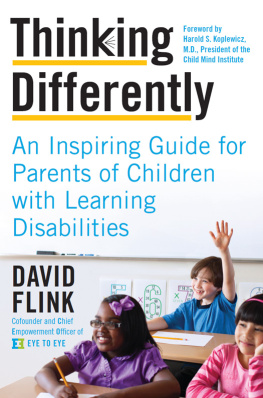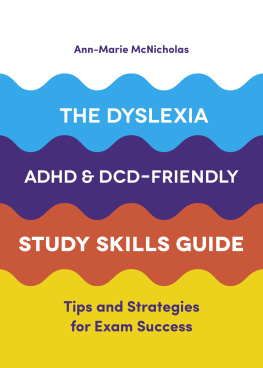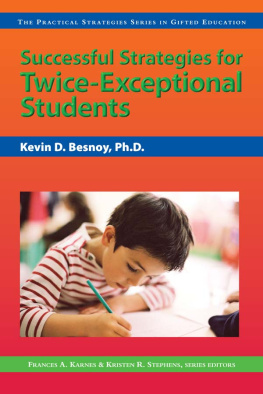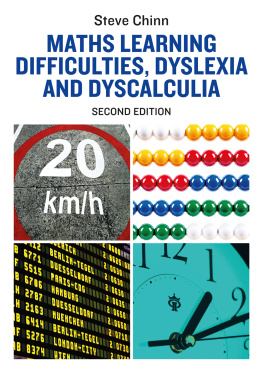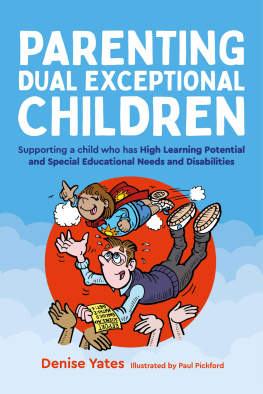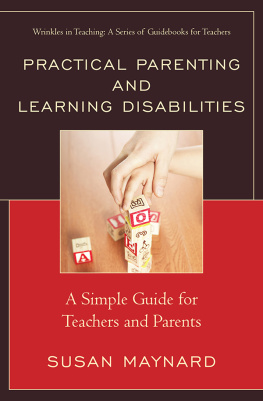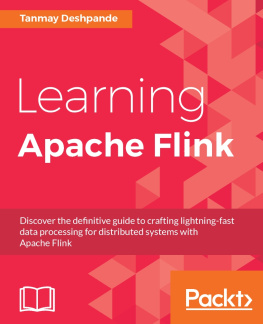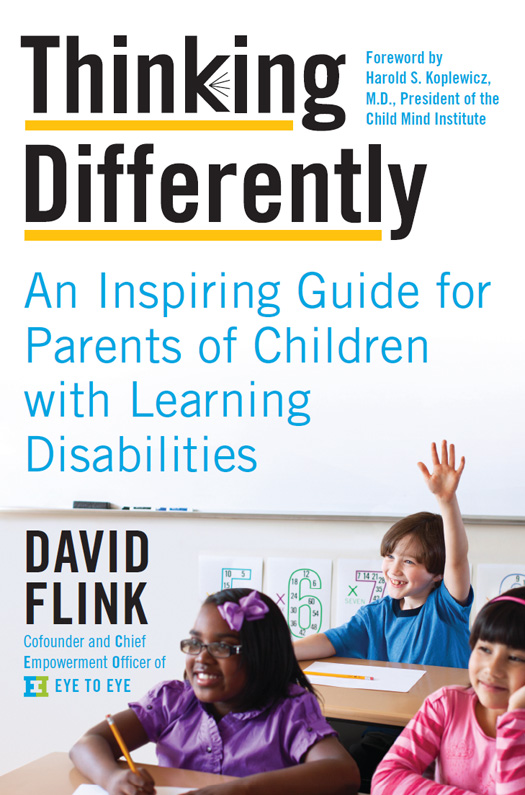In pursuit of ensuring an excellent education for all students and especially those with learning disabilities, Flink shares essential guidance for how to play a leading role in empowering children to succeed in school and in life. What a hopeful, optimistic book!
Wendy Kopp, founder of Teach for America and CEO of Teach for All
David Flinkthe most important leader of his generation in the growing movement to promote the beauty and benefits of cognitive diversityachieves two hugely important tasks in this marvelous book. He shares the key things LD/ADHD students (and their families) need to know to meet the challenges that those who think differently most often face; and he conveys the inspiring news that these individuals should never feel alonefor theyre part of a wonderfully talented and creative community, and by coming together they can grow, thrive, and love life and themselves as never before.
Brock L. Eide, M.D., M.A., and Fernette F. Eide, M.D., authors of The Dyslexic Advantage and The Mislabeled Child
I wish Id read David Flinks Thinking Differently when my wife and I first learned our son was dyslexic; its clear and informed guidance wouldve spared us a lot of confusion and duress. Im saying this not only as a parent but as a dyslexic who suffered many of the difficulties outlined in this wonderfully insightful book that strivesbrilliantly at times, I should addto shine a light on the fear and often unnecessary pain a learning disability so often results in. This book will stand out for the vigor of its insights and warm intelligence.
Philip Schultz, author of My Dyslexia and winner of the Pulitzer Prize
To all different thinkers,
ambassadors of the possible.
To my wife, Laura,
with whom anything is possible.
Contents
Writing isnt the easiest thing in the world for David Flink. Hed be the first to tell you thathe has both dyslexia and ADHD. But he has a terrific gift for storytelling. And for connecting with other people. And for doing things that look, at the outset, like theyre going to be too hard. And so David wrote this book not only to tell you his own story but also to share a great deal of insight into what it feels like to have learning and attention problems.
I first met David when he was a brand-new admissions officer at Brown University, where he had been an undergraduate, and his enterprise and networking talents were already becoming apparent. Thats where he started the remarkable organization he now runs, Eye to Eye, which reaches out to schoolchildren with learning and attention issues and hooks them up with college students who act as mentors.
In this book David is, in a way, offering himself as a mentor and guide to parents who are trying to understand what their kids with learning issues are going through, and how best to help them. Hes frank about his own struggles and failures and successesas well as those of many other kids hes met and mentored. He walks you through the testing-and-accommodation process in a very clear way, with lots of advice.
But what makes the book most meaningful to me (and Id guess to many parents) is the way he uses what hes learned, often the hard way, to help the rest of us help our kids with learning issuesand, perhaps more important, to help us understand them. David doesnt like to use the words disability and disorder. He thinks its better to call dyslexia and ADHD learning differences. And for him thats not just a euphemism: What this book is really about is how David, and the other kids he introduces us to, turned a disability into a difference by figuring out how they could learn effectively, instead of getting stuck on how they couldnt.
Davids starting point is the third grade, when he overheard his teacher telling his mom that the reason he was struggling was that he was just not trying hard enough. This idea was the bane of Davids young life, and he shows you how toxic that can be for kids with learning differences. One of the worst aspects of the just try harder approach is that it makes kids who are struggling double down on their reading or math basicsthe things theyre having the most trouble withwhile other kids are going off to art, drama, music, and other enriching classes. Its exactly the wrong approach, David writes, because finding strengths and successes in other areas is what kids need to develop the confidence they need to tackle big struggles.
David writes movingly of how his skill at magic tricks saved him as a childa passion, he notes, that must have been hard for his parents to tolerate, as they worried over his rocky progress in school. Doing magic shows for kids on weekends gave him the strength to get through the week. Magic offered a connection to other people, something I really craved as a kid who had a hard time socially, he writes. The confidence magic gave me was absolutely priceless and, in many ways, enabled me to get through middle school.
Instead of working harder, what David wants kids to do is work smarter, and that involves figuring out how they learn bestin his case by listening to information and talking to people instead of reading. He wants kids to feel comfortable making mistakes, because trial and error is the way you discover your learning strengths. And he wants them, above all, to feel comfortable asking for help. As he puts it, Mistakes are good, but asking for help is better.
David writes movingly about the many people whose help has been essential to him, and to the kids hes worked with. One of my favorite stories in the book concerns the crisis in tenth-grade biology class that led Davids father, who had been a radio announcer in college, to start reading his textbooks out loud, pacing as he read, into a cassette recorder. Before David was through school he had piles of his fathers cassette tapes everywhere, and to this day he carries one in his pocket as a reminder that no challenge is too great, especially with great allies.
One thing David is especially enthusiastic about is the fact that kids with learning issues today are much more accustomed to being open about their needs and asking for accommodations. Davids first accommodation in school was a laptop computer he was allowed to use for writing assignments and to take notes in class. Since the battery lasted all of an hour and a half, he had to sit near an electrical outlet in each class. And, this being 1994, the laptop weighed in at eight pounds and was too big to fit into his backpack along with his books. The solution: two backpacks. Having a learning disability has been described as having a monkey on your back, he writes. I had a laptop.
The laptop made an immediate impact on Davids grades, and his confidence as a student soared. But there was another consequence that was perhaps even more important, which encapsulates everything that followed, including Eye to Eyes successful programs. The laptop meant going public about his difference. Ill let David have the last word: Since so many learning differences are hidden, making them visible can be a positive step, despite the awkwardness. Being out in the open enables students to locate their LD peers and see that they are not alone. It also makes learning differences seem less mysterious, which in turn can boost students self-esteem as they recognize that their differences dont mean they are weird or stupid, but part of a valuable and important minority.
Its a minority David is proud to be part of, and proud to welcome other bright and talented and underrated kids into as well. We are lucky that David is here for all of our kids.

